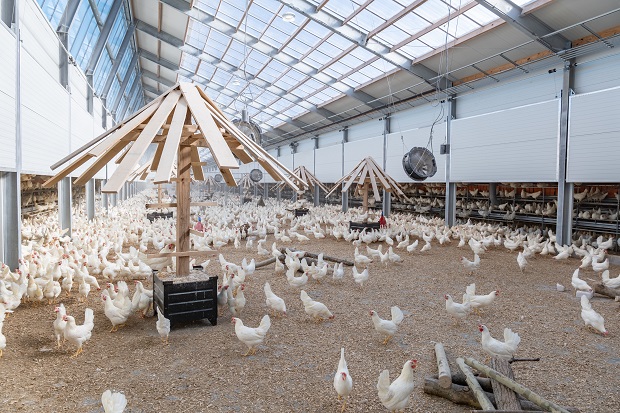- Lidl GB has today announced it will be the first grocer in Great Britain to start selling a new range of revolutionary eggs, in an exclusive partnership with Kipster
- Kipster’s unique planet and welfare-conscious approach to farming has led to its eggs having a significant carbon footprint reduction
- The Kipster “farm of the future”[i], which will be operated by Shropshire based Griffiths Family Farms, will feature live web cams streaming the chickens 24/7
- Lidl is urging Telford and Wrekin Council to approve plans this November, to ensure that shoppers have access to the eggs from Spring 2025
 Lidl GB is today announcing an exclusive UK partnership that will see it become the first Grocer in Great Britain to sell British eggs from the revolutionary egg company Kipster, which is said to produce “the most animal and environmentally friendly farms in the world”.[ii]
Lidl GB is today announcing an exclusive UK partnership that will see it become the first Grocer in Great Britain to sell British eggs from the revolutionary egg company Kipster, which is said to produce “the most animal and environmentally friendly farms in the world”.[ii]
Kipster’s industry leading and transformative farming concept will see British eggs produced by chickens that are farmed to the highest welfare standards and which have a significantly reduced carbon footprint, with the remaining offset through the purchase of carbon credits.
Having first introduced its egg farming concept to the Netherlands in 2017, Kipster’s exclusive partnership with Lidl GB means British shoppers will be able to purchase eggs sourced from Kipster’s British “egg farm of the future” from Spring 2025, once planning permission for the farm in Shropshire has been granted.
The Kipster concept has been developed in partnership with scientists and animal welfare organisations to meet the needs and instincts of chickens. The farms, which exceed typical free range standards, enable the animals to roam freely inside or out, with access to an indoor playground filled with daylight and fresh air. Through the installation of live 24/7 web cams and the conditions chickens live in are available for all to see, any time, any place, demonstrating Kipster’s dedication to transparency.
Peter de Roos, Chief Commercial Officer at Lidl GB, said: “When we first met with Kipster, we were instantly struck by their devotion and commitment to providing the highest welfare standards for chickens and roosters, whilst also doing right by the planet. At Lidl we want to give our customers the very best products at the best possible prices, which is why we’re so excited to be the first grocer to bring Kipster’s eggs to our stores across Great Britain. We would urge Telford and Wrekin Council to approve the plans to ensure that British shoppers have access to this industry leading egg.”
Ruud Zanders, Founder of Kipster, commented: “We are delighted to be working with British farmers who are keen to take the next step towards more animal welfare and environmental sustainability. We are immensely grateful to Lidl for the trust they put in us to get Kipster off the ground in the UK. With their support we farmers can close the gap between what we’re doing and what people want and need, which is more ethically and sustainably produced food.”
Dr Tracey Jones, Global Director of Food Business at Compassion in World Farming said: “We fully support Kipster’s innovative barn system for laying hens as it addresses both animal welfare and sustainability concerns, as well as providing a good working environment for the farmers.
Compassion awarded Kipster a Good Egg Award and Best Marketing Award in 2018 for promoting their welfare and environmentally friendly eggs, and we believe the Kipster concept has real potential for replication and growth in the future.”
The company also has a clear commitment to tackling food waste. It takes a circular approach to what the chickens and roosters eat, with animals eating a newly developed feed that is made of by-products from crop and food processing, such as faulty pasta products or unwanted food from bakeries. The resulting upcycled feed has a carbon footprint that’s around 40% that of conventional chicken feed, with the remaining GHG emissions offset through carbon credits. It also shuns the standard industry practice of culling newly born roosters given their inability to lay eggs, instead rearing them in their friendly farms to eventually be used for meat.
The Kipster “farm of the future” will be operated by Shropshire based Griffiths Family Farms, who currently have planning application in with Telford and Wrekin Council for the new site, which is set to be determined next month [November].
The introduction of Kipster eggs in Lidl stores follows the discounter’s industry -leading move to introduce Welfare Windows on packaging to improve supply chain transparency for customers.
[i] Here’s what the egg farm of the future looks like | The Poultry Site
[ii] Everything you need to know about laying hens – Laying Hens (hendrix-genetics.com)





Comments are closed.